Father Knows Best: An Interview with Jeff Lemire
May 27, 2012
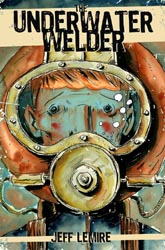 |
Jeff Lemire continues to make a name for himself in the comics world. His graphic novel Essex County was named one of Canada’s Top Five novels for 2011 in a CBC poll and his work on DC Comics’ Animal Man and Vertigo’s soon-to-be-ending Sweet Tooth have garnered a wide range of critical praise.
August will see the release of Lemire’s latest graphic novel, The Underwater Welder, from Top Shelf Productions. The novel focuses on Jack Joseph, an underwater welder working off the coast of Nova Scotia, and soon-to-be father. As the due date moves closer, Jack finds himself under increasing pressure — not just from his impending fatherhood — but the legacy of his own father, a welder himself who disappeared when Jack was young. After a mysterious encounter under water, Jack finds himself coming to terms with his roles as both father and son.
**********
PREVIEWSworld (PW): Fatherhood is at the core of Underwater Welder, and it's also an important thread in Animal Man and Sweet Tooth. Do you think writing about these characters and relationships has made you experience fatherhood differently?
Jeff Lemire (JL): I don’t think writing and creating comics has changed how I experience fatherhood. I think experiencing fatherhood has changed how I make comics. When I started out on The Underwater Welder four years ago, I was still not a Dad myself. I think the book was really about the stress and fears of impending fatherhood that I was feeling at the time. Then, over the course of creating the book, I had my first child, a boy, and my perspective changed so dramatically that the book itself turned into something else as well. As I worked on it became much less about fear and pressure and much more about a celebration of fatherhood in a strange way…an acceptance of it. And, the same goes for Sweet Tooth and Animal Man. I don’t think I could have written and drawn those books the way I have if I weren’t a father myself when I started them.
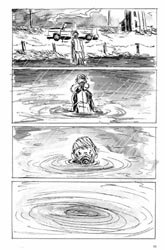 PW: Underwater Welder seems to deal not only with the tension of the main character’s impending fatherhood, but his having to explore the events that occurred with his own father as well. Was that reflective of your experience as a parent-to-be, or did that develop as part of the narrative (or possibly both)?
PW: Underwater Welder seems to deal not only with the tension of the main character’s impending fatherhood, but his having to explore the events that occurred with his own father as well. Was that reflective of your experience as a parent-to-be, or did that develop as part of the narrative (or possibly both)?
JL: Really, that is fictional. While I was experiencing certain stress and fear over becoming a father, I exaggerated it here and used the character and his situation as a metaphor. It’s an exaggerated, fictionalized version of what I was feeling. I also wanted to get back to experimenting with weaving a narrative between past and present the way I did in Essex County. So all of that went into the narrative structure of The Welder.
PW: While there’s a strong science fiction element to this book, the character interaction and emotional aspects is clearly the core of the story. Do you ever find it difficult (with this or your previous works) to balance those aspects?
JL: No, I love taking genre elements or tropes and then representing them in a new and interesting way but putting the focus not on the big plot moments but rather the quiet character moments. It’s not dissimilar to what I did in Sweet Tooth with the post-apocalyptic /adventure genre or Essex County by using a sports story. To me juxtaposing that kind of genre elements weather they are sci-fi, horror or whatever with quiet character studies creates a really interesting tension and helps present both aspects in a fresh way.
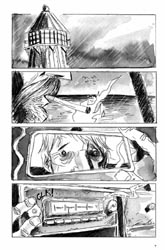 PW: You've said that this book was harder for you to finish because it was outside the regular schedule of the monthly books. Is there crossover between the pressure of bringing a child into the world and your own struggle with pressure to deliver the book?
PW: You've said that this book was harder for you to finish because it was outside the regular schedule of the monthly books. Is there crossover between the pressure of bringing a child into the world and your own struggle with pressure to deliver the book?
JL: I’d like to think any work pressures I had or have are very different from my personal life, but the fact is that my work bleeds into all aspects of my life and vice versa. So I’m sure the stress and pressure I felt trying to complete The Underwater Welder found its way into the comic in some way.
PW: Did you know early on that this book would be about a welder, specifically? Was it a profession you had to research?
JL: I’ll be totally honest…I did very little research into underwater diving and welding itself. I was just enamored with the visual aspects of it and use it more as a fantasy-like metaphor than a gritty, realistic study of the profession itself. In other words I was more interested in the atmospherics of it than the details.
Though having said that I do have a bit of experience welding myself (the dry kind). When I was a teenager, I worked in a Tool and Die factory with my dad for six or seven years and did a lot of welding there.
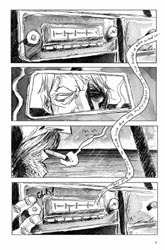 PW: The town in Underwater Welder, Tigg’s Bay, is fictional, but how different is it from an actual town in the area?
PW: The town in Underwater Welder, Tigg’s Bay, is fictional, but how different is it from an actual town in the area?
JL: It’s totally fictional and unrealistic. I wanted it to feel like a true ghost town, a final outpost detached form the rest of the world. I wanted the town itself to be very much like an imaginary place between places where Jack and Susie felt totally alone.
PW: Along with your graphic novels published by Top Shelf, you also write a number of titles for DC Comics. How different are your experiences writing your own characters versus established ones? Do you find yourself having to “shift gears” creatively?
JL: I enjoy balancing the two worlds. It helps to keep my work for both mainstream comics and indie comics fresh when I can jump back and forth between them. I also like seeing aspects of both worlds start to bleed into each other.
For instance, I think the pacing of my personal work has improved. I’ve become more economic with space at times so that when I want certain scenes to feel “slow” or long, there is a better contrast there. That comes from having to fit stories into 20 pages each month with DC. And I always try to bring as much of my personal aesthetic and voice to my DC work as I can.
In the end I love being able to play in both worlds.
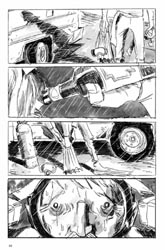 PW: Does working on these books take away from your desire to work on original ideas, or does it give you more drive to do something completely your own?
PW: Does working on these books take away from your desire to work on original ideas, or does it give you more drive to do something completely your own?
JL: No at all. They feed each other. Doing DC stuff always gives me a lot of new ideas that I can bring into my personal work and vice-versa. Like I said, I’ve come to thrive off of balancing work in both worlds. My personal work will always come first though. Luckily I’m able to juggle a lot of work, but if I had to slow down and choose, it would always come back to projects like The Underwater Welder. Worlds that I create for myself, by myself. As fun and exciting as the DC stuff can be, there is no comparison with the creative freedom I experience while working on these types of books.
|
Fathers & Comics: Tell us your story and win! Maybe your father gave you your first comic book. Maybe he read you comic each night you went to bed. Tell us how your father got you starting in in reading and/or collecting comics and you could win a copy of the Underwater Welder, signed and sketched by Jeff Lemire himself! Here's how to enter: 1. Go to the PREVIEWSworld Facebook page. 2. In a short paragraph, post on our page how your father got you involved in comics. 3. All entries will be be entered into a random drawing to win a copy of the Underwater Welder, signed and sketched by Jeff Lemire. Good Luck! |




